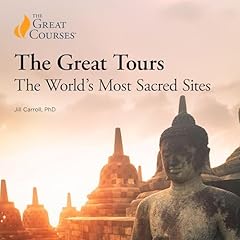
The Origin of Civilization
Failed to add items
Add to Cart failed.
Add to Wish List failed.
Remove from wishlist failed.
Adding to library failed
Follow podcast failed
Unfollow podcast failed
Get 3 months for $0.99/mo
 Prime members: New to Audible? Get 2 free audiobooks during trial.
Prime members: New to Audible? Get 2 free audiobooks during trial.
Buy for $30.76
-
Narrated by:
-
Scott MacEachern
What defines a civilization? How did the first states emerge? How were the world's ancient states similar and different? Answer these and other dramatic questions with this grand 48-lecture course that reveals how human beings around the world transitioned from small farming communities to the impressive cultural and political systems that would alter the course of history.
Taking a gripping archaeological and historical approach to formative states such as the ancient Egyptians, the Chinese, and the Maya, Professor MacEachern completes your understanding of the history of civilization by exploring it at its earliest stages. Unlike traditional surveys of ancient civilizations, which tend to focus only on the glorious achievements of these cultures, you'll look at those first all-important steps that the world's first civilizations would take on the road to glory.
You'll investigate places such as Mesopotamia, where agriculture laid the foundation for groundbreaking experiments in social and political development in places like Uruk and Sumer; the eastern Mediterranean, where expanding maritime trade during the Bronze Age increasingly knit the different societies of these islands into a web of political and economic relationships; and Mesoamerica, where the indigenous states in and around what are now Mexico, Honduras, and Nicaragua reveal the full flowering of Olmec and Maya civilization.
You'll also take an engaging look at what archaeologists have learned from some of the world's oldest and most intriguing sites. In the end, these lectures will leave you awestruck at the diverse ways that ancient people crafted complex systems - systems whose broad strokes remain with us even today.
PLEASE NOTE: When you purchase this title, the accompanying reference material will be available in your My Library section along with the audio.
©2010 The Teaching Company, LLC (P)2010 The Great CoursesListeners also enjoyed...




















People who viewed this also viewed...


















by design, a less-narrative presentation.
Something went wrong. Please try again in a few minutes.
Deninitely needs a good edit and some silence trimming
Good content, bad reader
Something went wrong. Please try again in a few minutes.
knowing the past will guide us in the future
Something went wrong. Please try again in a few minutes.
Great course
Something went wrong. Please try again in a few minutes.
The strength of this course is in its (2008-2009) compilation of archaeological cases. Dr. MacEachern (as well as the course guide) gives substantial attention to less popularly studied as well as to the most famous cases of "ancient" (read something akin to Before Encountering States of Other Origins) state formations. Not every region or case one could possibly expect is covered, but the ratio of breadth to depth in the survey seems quite reasonable. The inclusion of four Sub-Saharan and one South East Asian lectures, not to mention over a dozen on Meso- and South American peoples, in the 40 civilization-focused lectures are in no way to be taken for granted in surveys of world civilization! Similarly, this course is an interesting source for another "rare pick," if you will, in its his extensive discussions of the archaeological theory, its aims, methods, and limitations. I love world history and I don't know now how many comparative works I've read from how many angles: I didn't know everything here (if you did, I accuse you of being an archaeologist).
Another commendation, Dr. MacEachern's personal passion for Sub-Saharan archaeology is truly remarkable even among the compelling lecturers I've heard from the Great Courses. One hears in his voice in his African lectures, he would feel truly gratified if he did well to make his listener appreciate some of the unsung African variants of ancient civilization. I respected the depth of his conviction greatly. I believe he succeeds.
On the other hand, I think that no one shall scold Dr. MacEachern for overreaching in his conclusions. Much of the time, he seems intent to inform us what not to think as what to think. Often he's probably right to ward off unexamined biases from days gone by. But sometimes it's a little amusing that he thinks we all know enough about South East Asian historiography, say, to require lengthy convincing to stop conceptualizing it through the term 'mandala' ;)
He can make himself sound a little One Darn Thing After Another in his resistance of bringing conclusions too hastily from his data. He does argue, ultimately, that there are no simple answers to how and why states arise generally: flood plains, urbanization, distance trade in elite goods, specialist non-food-producers and social stratification, intensive agriculture, starchy crops, and numerous other phenomena MAY be associated with early states. But Dr. MacEachern's survey finds that none is present in EVERY case, and so none is necessary, and no general explanation of the causation of states is anticipated. Amusingly, it would appear that the one thing we can count on archaeologists' finding in early states is a budding ideology to justify the state; this, though archaeologists have rather a hard time digging up ideologies.
All told, if you want to hear the very diverse descriptions of numerous famous and "rarer" early civilizations, with intellectually honest and careful attention paid to the limitations of archaeological theory, listen up!
Global survey finds
Something went wrong. Please try again in a few minutes.



